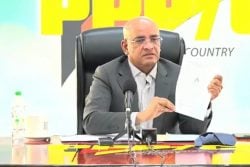With over three months of his administration having elapsed, there will be ever growing interest in where President Ramotar stands on issues and what he stands for.
In a general sense the public, supporter and non-supporter alike, has an understanding of where a PPP President may stand on ideology and the economy. Former President Jagdeo aside, the public would associate President Ramotar more with the Jagans – representing a mix of the hankering for the old party ideology while pragmatically reaching away from this for both political and economic reasons.
With the party’s founding ideology having ossified following the collapse of the Soviet empire, the closest one gets these days to a whiff of its old ties are the occasional reference to the liberation movements, lectures on the undemocratic removal of famed leftists and Marxist buzz words. What the party’s actual ideology is today may be a mystery even to its most ardent followers. Perhaps, the country is the better for it. Ideologies invariably stultify and defy reason.
As the American writer Greg Mortenson said when comparing literacy and ideology, “It is our belief that the first helps to thwart intolerance, challenge dogma, and reinforce our common humanity. The second does the opposite.”
His critics may however cast President Ramotar in the mould of an ideologue, someone who drank deeply of the party’s ideology and teachings for decades and must now find a way to separate himself from it or put it into perspective for the sake of the task at hand – the running of the country in the interest of all citizens. It is even more challenging for the President as his critics will further argue that he has had no experience of running a ministry or big corporation and had little other relevant skills to bring to the Presidency. Besides being General Secretary of the party following the death of Dr Jagan – being seen as a safe pair of hands whose occupancy of the post would limit internal strife and jockeying – his other longstanding engagement, as a director of the troubled GuySuCo, poses uncomfortable questions as to what his actual impact there was. So there is much for him to reveal to the public about his positions and plans and much for the public to discover.
When he addressed the 15th death anniversary observance for Dr Jagan at Port Mourant two Sundays ago, President Ramotar had a valuable opening to begin setting down markers on where he stood and what would come in the future. Unfortunately, the only thing he succeeded in doing was attaching himself more closely to the party’s deep past as some feared he might and giving a nod to his predecessor, former President Jagdeo whose tenure will no doubt continue to pose numerous problems for President Ramotar.
Speaking of Dr Jagan, President Ramotar said, according to GINA, that the methodology used by the late President on national issues is more relevant than obsolete to many of the challenges facing Guyana today. He did not elaborate on exactly what he meant by methodology though many would question over what period and on what national issues he was referring to. President Jagan’s term from 1992 to 1997 will be remembered more for the return of democracy and the frustrating realities of coping with governance than stellar successes.
He then transformed Dr Jagan into a sort of an oracle, someone who could see far and accurately.
“Comrade Cheddi wrote and spoke of many of the developments that are taking place today and, he predicted many of them. He was able to do that because he took a scientific view of politics and developments generally,” President Ramotar stated. Whatever these developments are, even if they had been properly predicted and scientifically at that, it by no means meant that Dr Jagan had the solutions to them and more to the point, the task of dealing with these matters now falls to President Ramotar.
The President then proceeded on a more troubling path when he likened the present valid concerns about a range of projects entered into by the Jagdeo Adminis-tration to the criticisms that Dr Jagan had experienced during his premiership over major projects like the Black Bush Polder Scheme and the establishment of the University of Guyana. By juxtaposing these two entirely different periods, with grossly varying factors at play and indeed colony versus independent, President Ramotar left himself vulnerable to those who may paint him as an ideologue.
This presentation at Port Mourant – his inaugural address to parliament was lacking in substance – is perhaps the first serious basis for assessing where President Ramotar stands on good governance, transparency and rectification as it relates to those controversial projects he mentioned. He cited the One Laptop Per Family programme, the Amaila Falls Hydropower project the Cheddi Jagan International Airport expansion project and the proposed ethanol project for which a secret MOU was clinched with ANSA McAl.
As fate would have it both of the first two have continued to experience serious problems leading to the recent unexplained departure of the manager in one case and the termination of the road contract of the highly controversial Fip Motilall in relation to the Amaila Falls hydro project. As it pertains to the airport, a secret arrangement was made by former President Jagdeo with a large Chinese company through the agency of Beijing and in respect of the ethanol MOU there can be no doubting that the government here wanted this deal hidden for some unsavoury reason and only addressed it when a Trinidadian newspaper reported it.
If indeed President Ramotar believes that the complaints being raised about these projects are without validity and contrived then he is seriously out of touch with the issues at stake here and certainly with the majority of Guyanese who voted against his party at the November 28 general elections. If he really believes as he said at Port Mourant “Our detractors do not want to have any kind of development in this country because they are working on the philosophy that if things are bad for our country it would be better for them”, then President Ramotar is making a huge mistake.
The President and his government have nothing to lose from weighing and judiciously evaluating the concerns of stakeholders – many from outside the political sphere – on these projects and making rectifications where necessary. This is the juncture at which the public will begin assessing President Ramotar’s tenure as distinct from former President Jagdeo’s. As beholden as the President might have been to Mr Jagdeo for his accession to the Presidency, the point of departure arrives when Mr Ramotar has to draw sober judgements on these major projects which could have serious and lasting repercussions on all citizens and the economy of the country. This dilemma is not to be cast in the format of the ideological hotbed of the 50s and 60s as President Ramotar essayed when he said at Port Mourant that the opposition was using its one-seat majority in Parliament to stymie development in a manner reminiscent of 1964 and that “Comrades these are signs, these are danger signs that we must observe… the leopard has not lost its spots”. With this outlook and tone, the prospect for advancing debate in the country, any debate will be exceedingly dim.
One could perhaps say – as was the case with former President Jagdeo – that events at Port Mourant, the birthplace of Dr Jagan, stoke fiery rhetoric because this is what is necessary for this important constituency particularly because of the defections that occurred to the AFC at the recent elections. However, there will come a time when all of that has to be eschewed and the President and his government have to plant their flag firmly over the positions they have taken. This opportunity will arise on Thursday when parliament convenes and when questions related to some of the aforementioned projects are raised by opposition MPs. The answers delivered by the various ministers and their willingness to elaborate and provide clarifications and agreements will speak loudly as to where President Ramotar really stands and what he stands for, his presentation at Port Mourant notwithstanding.





